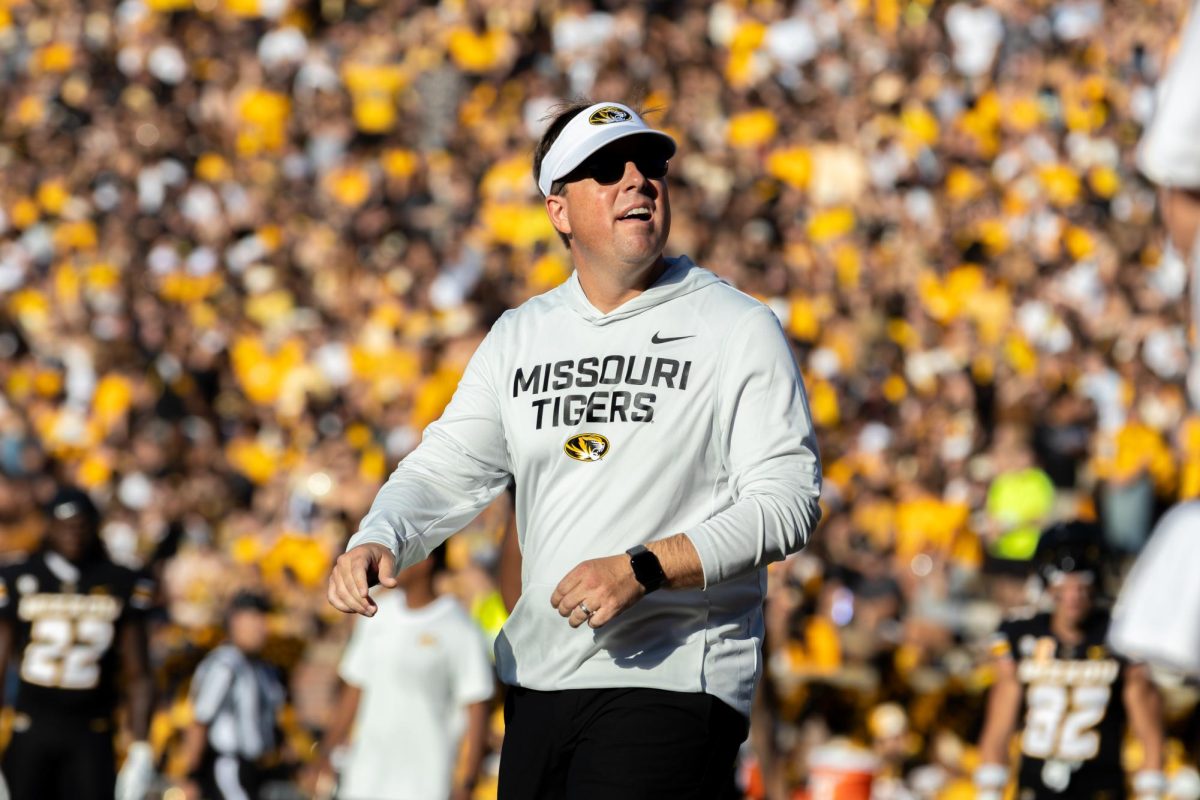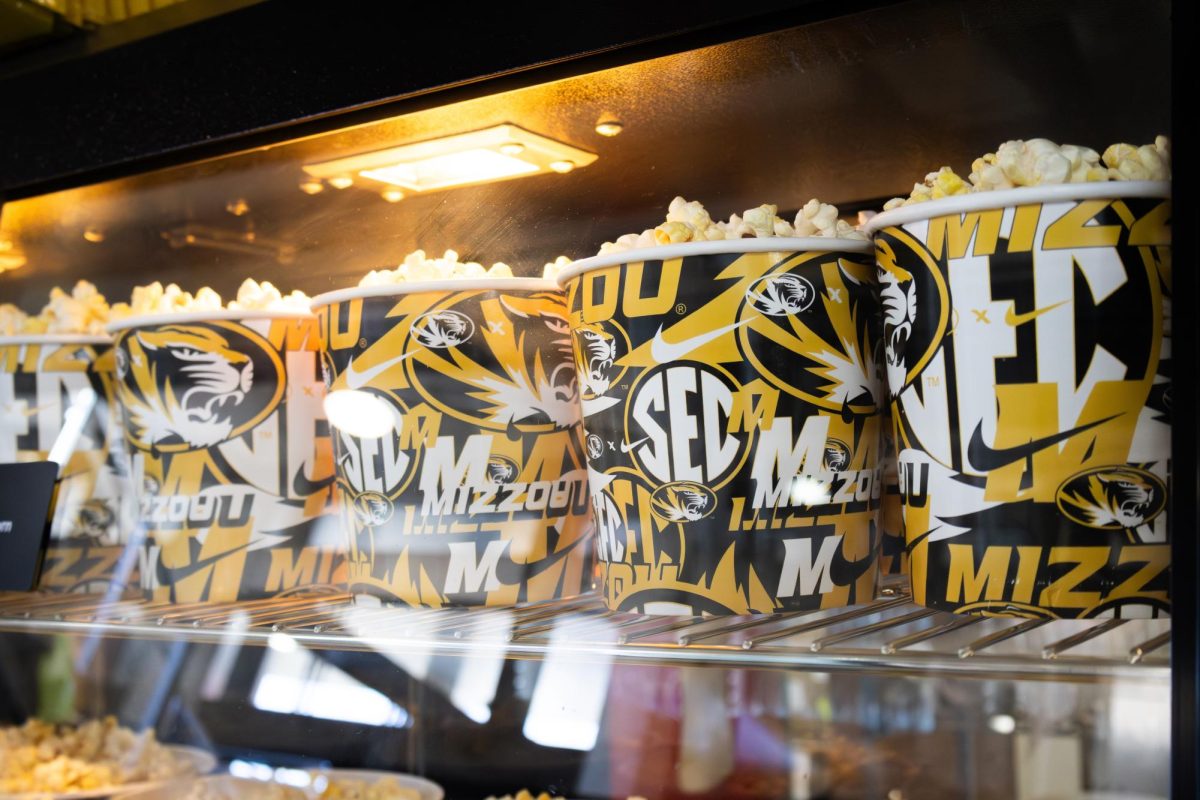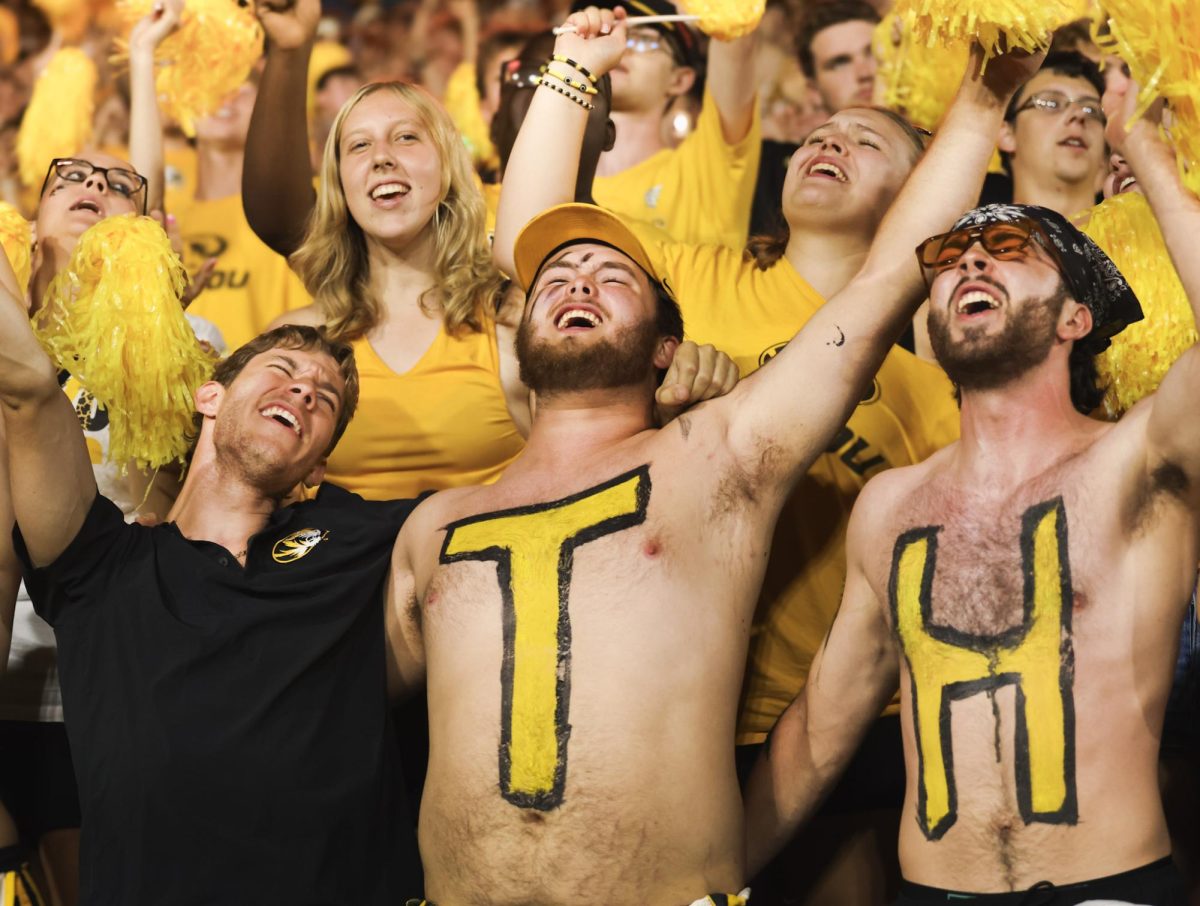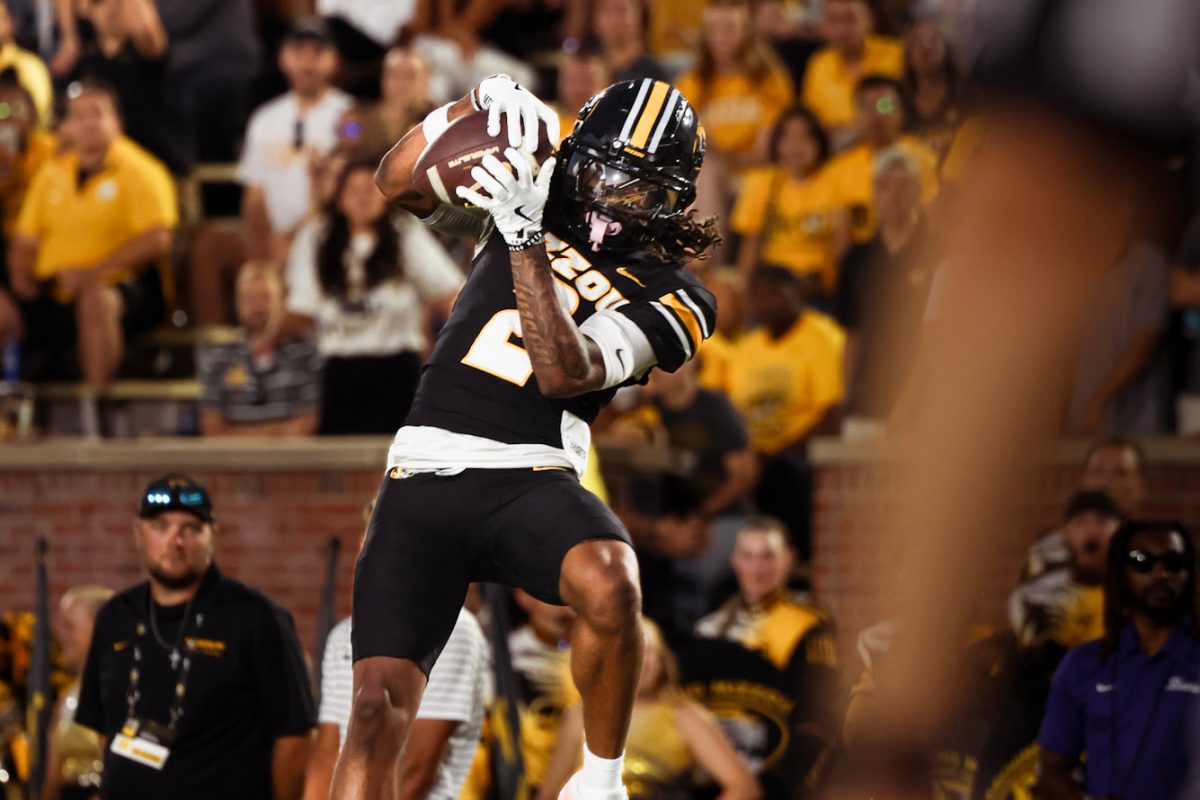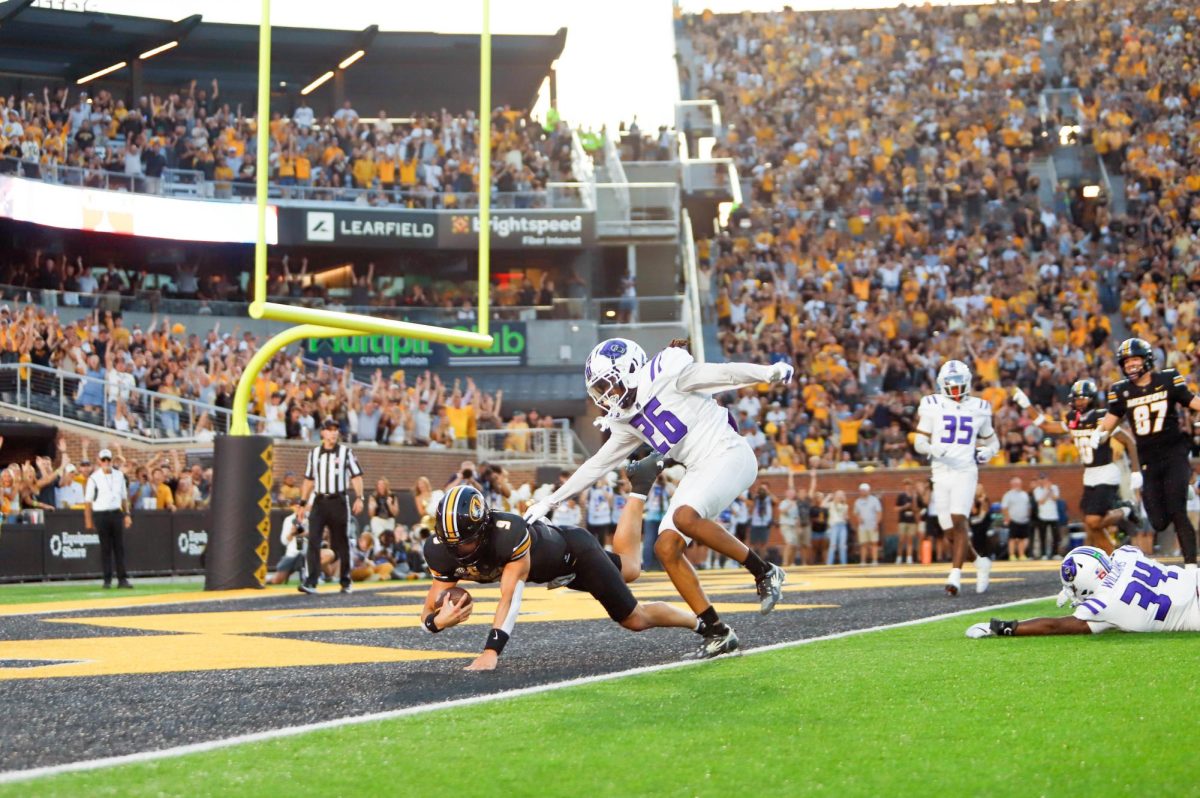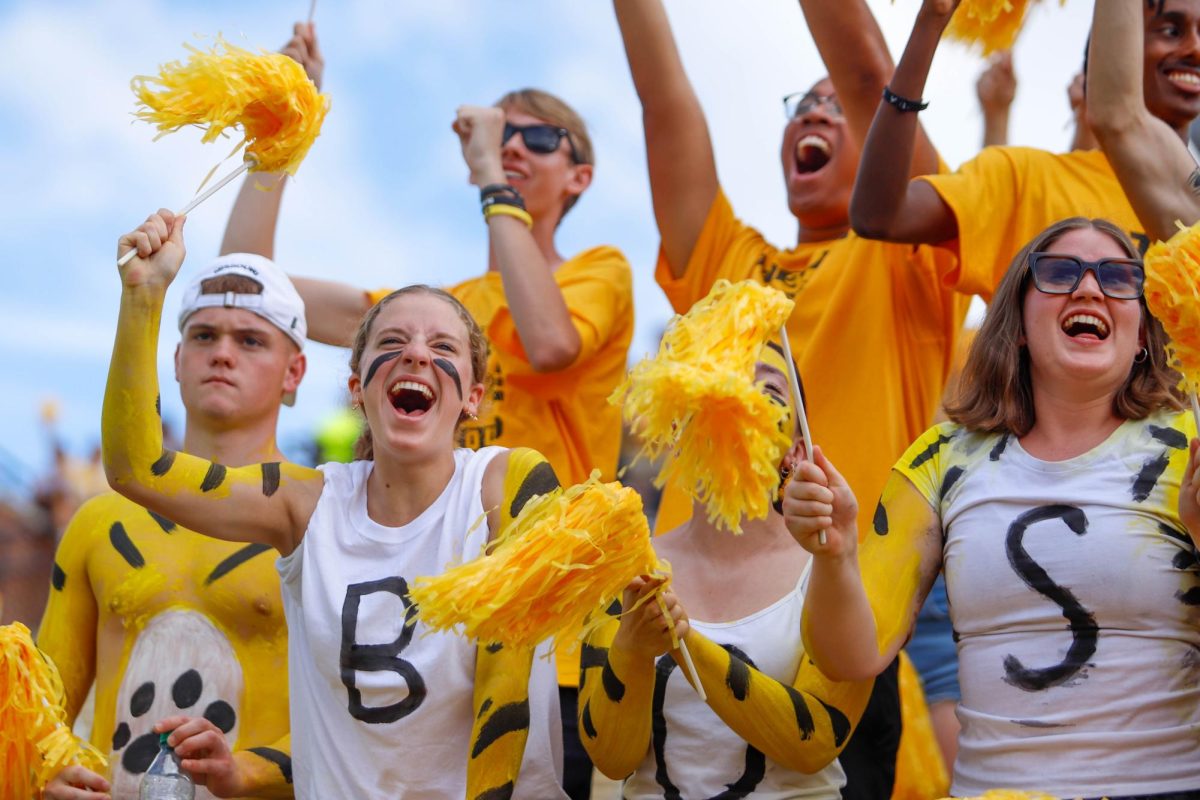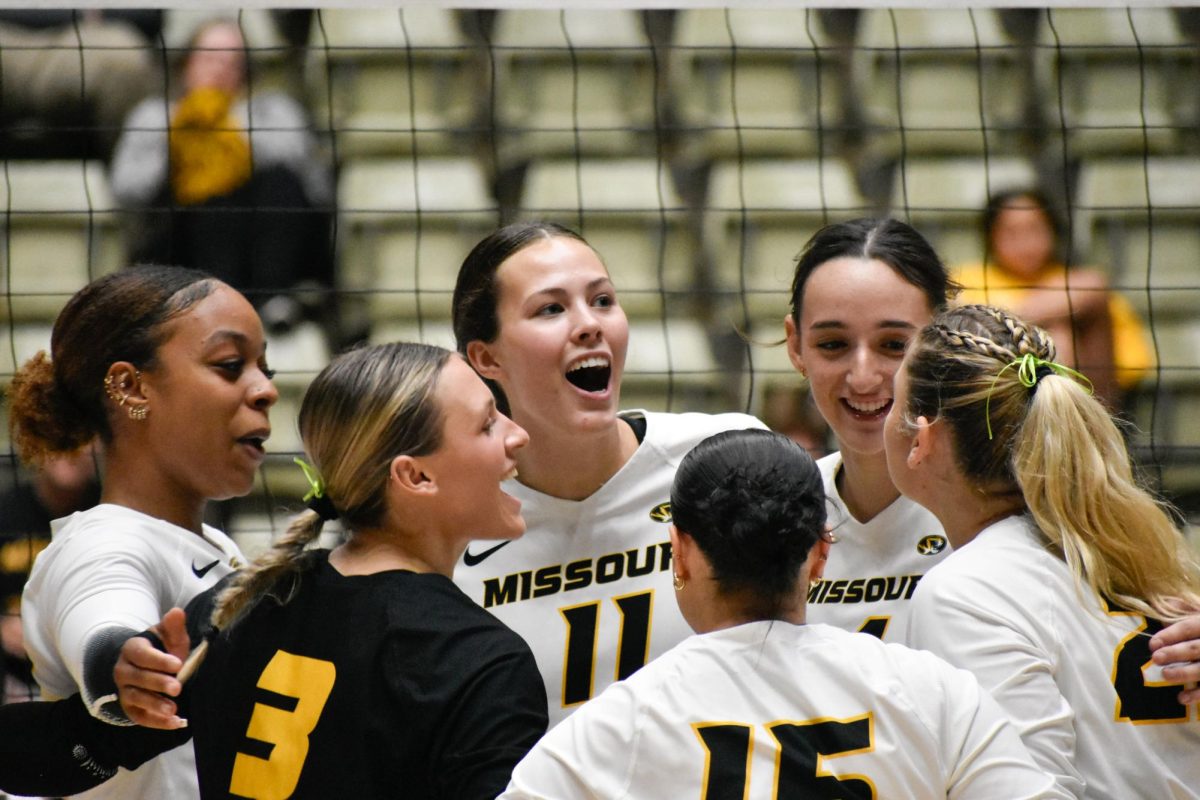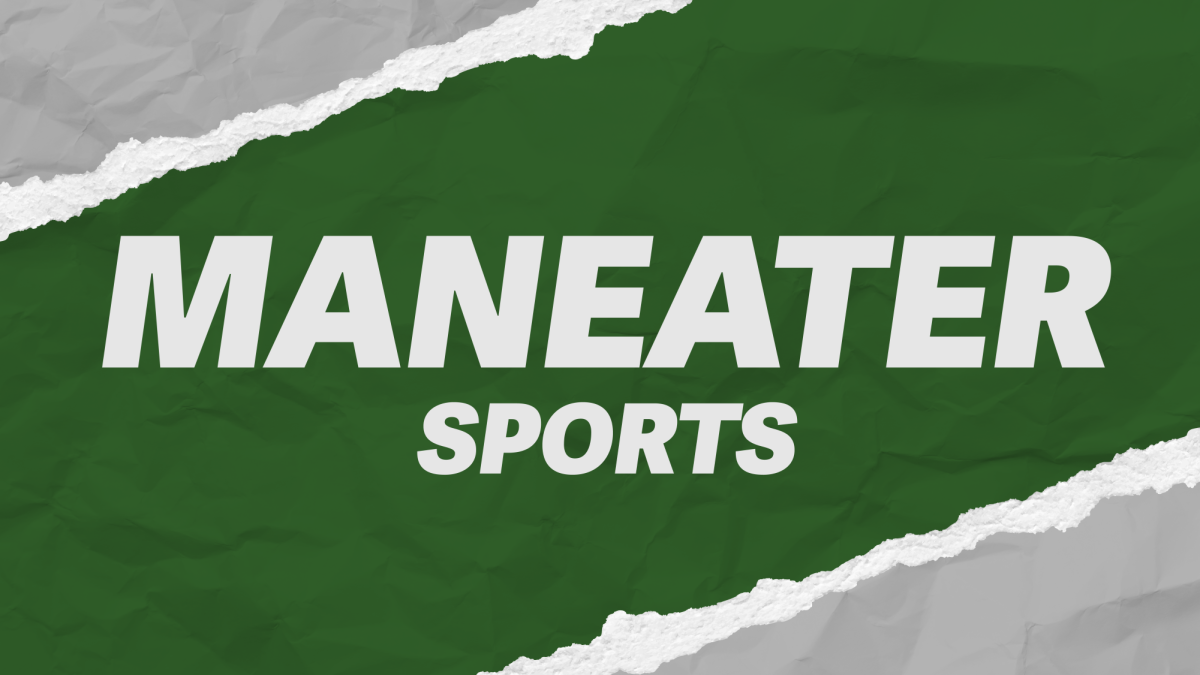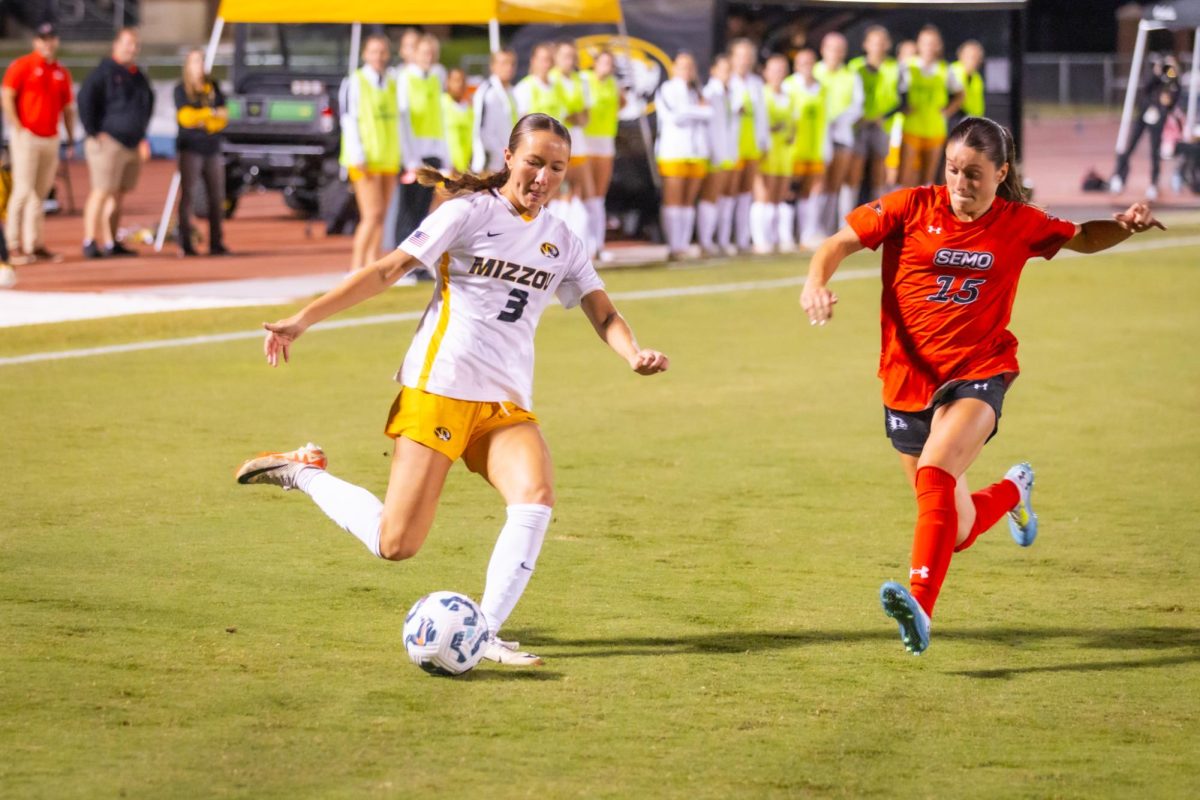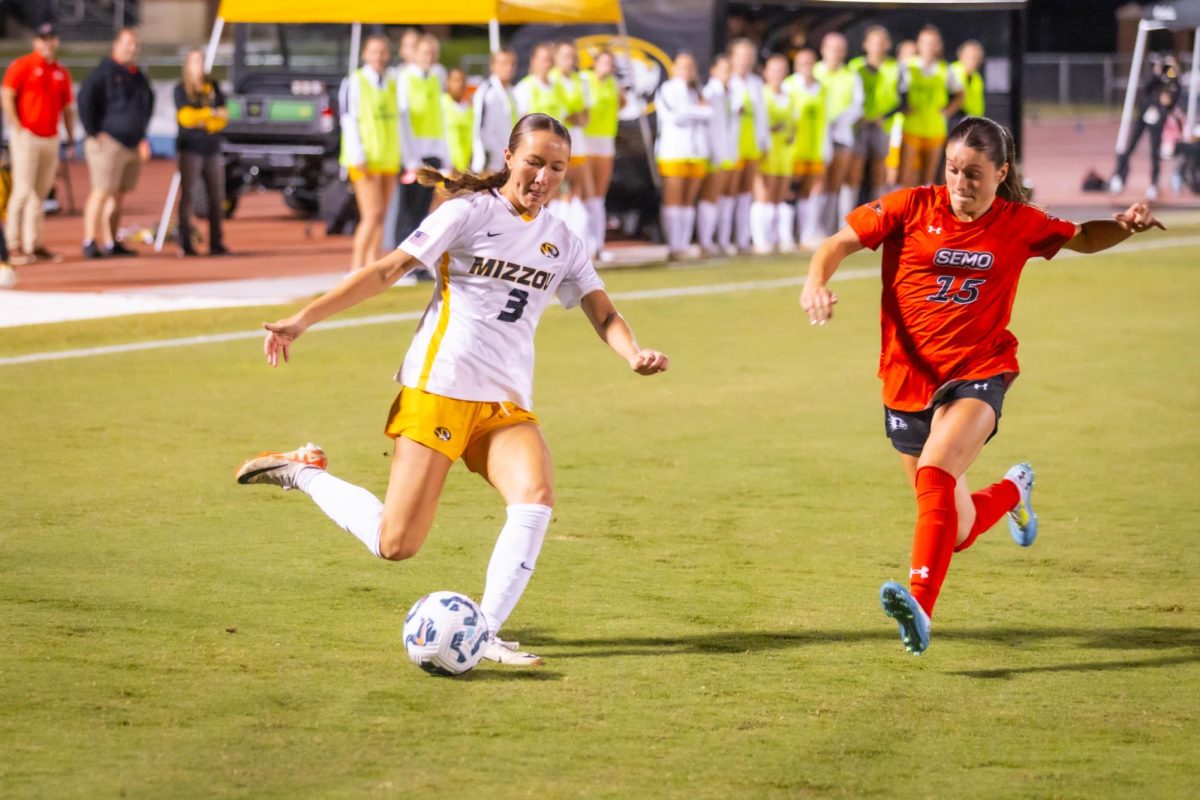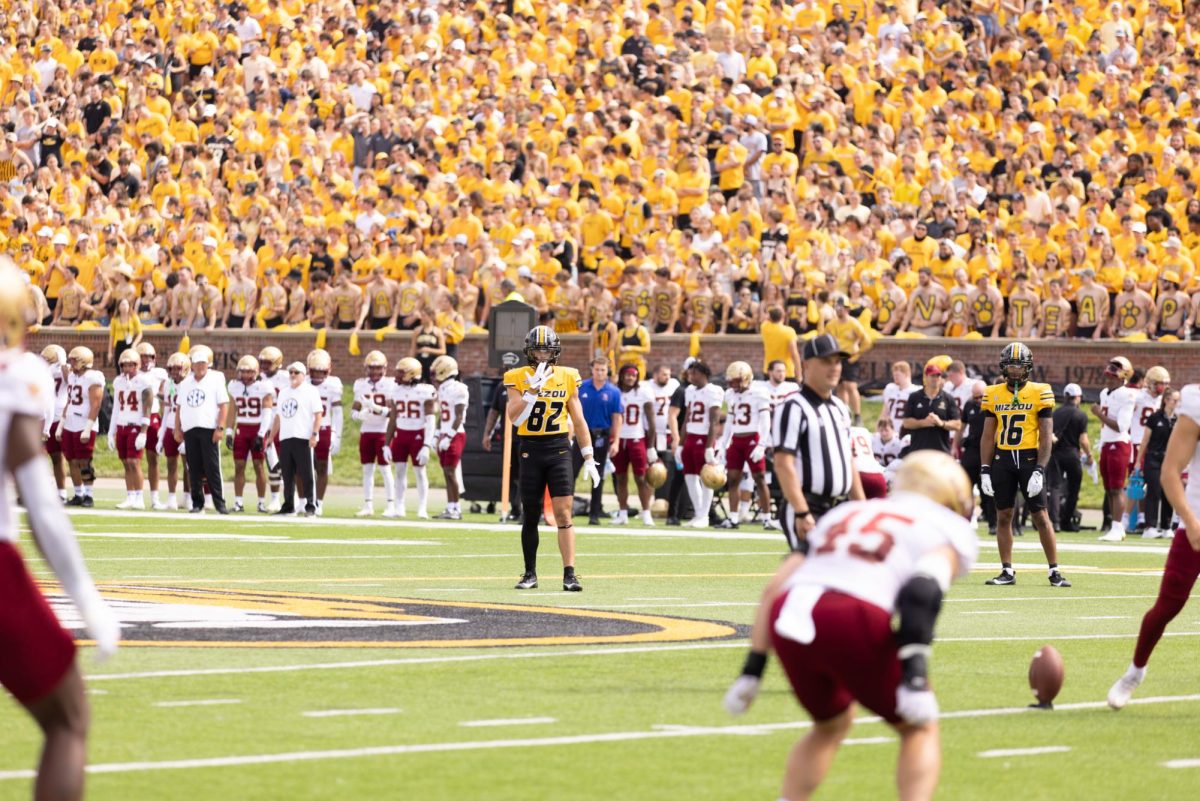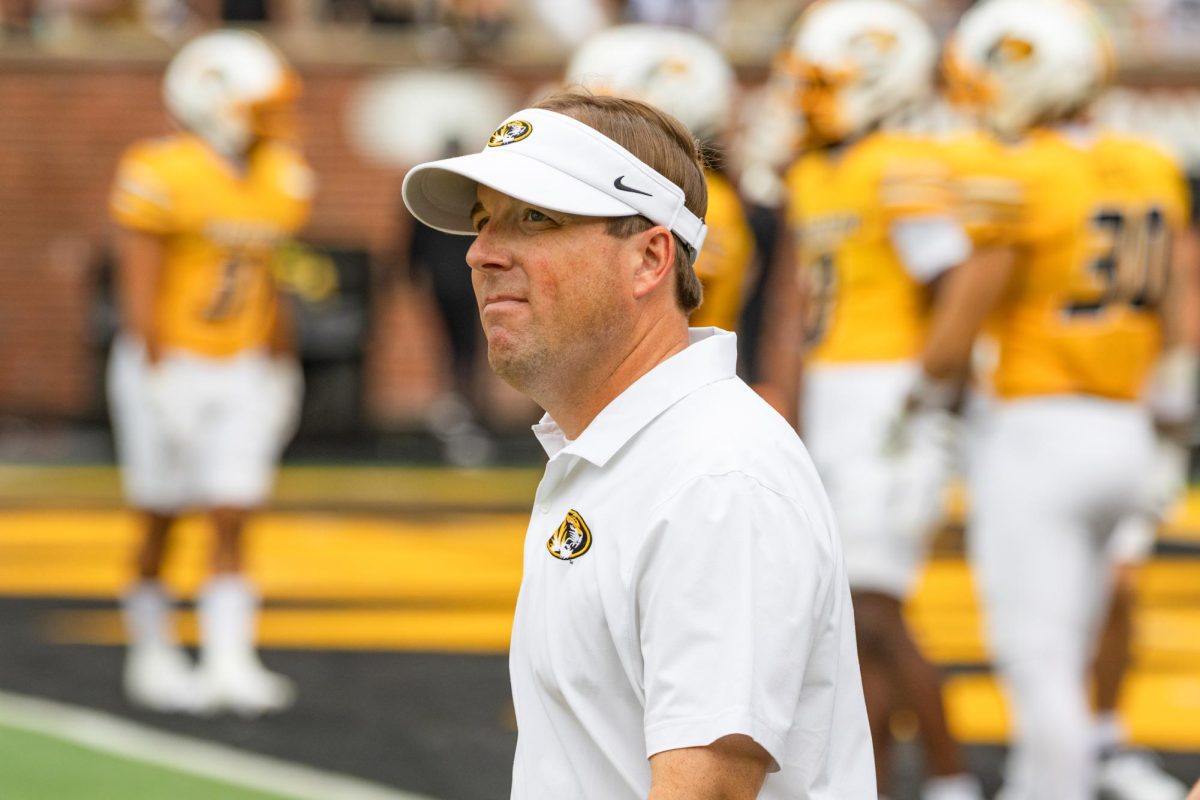MU prides itself on its “Missouri Method,” and for seniors Parker Rehm and Kyle Jones, that means one week a year, they get to broadcast a Tigers’ football game to thousands of listeners live from Faurot Field.
Rehm loves the atmosphere, energy and feel in the booth high above the Tigers’ sideline on a game day. Jones can’t help but note the spectacle of calling a football game at a Southeastern Conference school. Each year, the pair spend weeks watching film and creating their boards in preparation for a single game day.
This season, Rehm and Jones were assigned the Georgia and Arkansas games, respectively, but neither will be in their customary spot at Faurot to call the game. They won’t have the luxury of on-air silence being filled with the roar of nearly 63,000 fans. Instead, due to COVID-19 protocols, they will sit a mile away in the KCOU studios, calling the game off a monitor.
“It’s a bummer,” Rehm said. “At Faurot Field, we don’t have a great place to sit, and our booth is pushed into a corner; it’s in this little soundproof booth, and it’s away from the action. But you know the experience is still there; it’s still so cool to see yourself. You’re calling the action. You’re broadcasting the action to these people. And people aren’t going to get to do that [this season].”
KCOU is one of two stations that broadcast football games in Columbia. While the student-run radio network will call and produce every game from beneath the MU Student Center, ESPN Radio affiliate KTGR will still be posted up at Faurot. Mike Kelly, the play-by-play voice of the Tigers, will enter his 27th season calling Missouri football while recently-retired KOMU sports director, Chris Gervino, prepares for his 29th season as KTGR’s sideline reporter.
Due to COVID-19, calling a college football game in 2020 will be different than ever before –– there will be plenty of new rules and regulations at the very least –– but Kelly stressed that nothing about the actual games will change. If anything, he pointed out, a more hushed Faurot atmosphere could provide moments that enhance a broadcast.
“Having [fewer] fans may actually add certain elements that we’ve never had before,” Kelly said. “We may actually hear coaches’ voices from the field, and we haven’t had that opportunity before because of crowd noise. I think it could be unique.”
However, that won’t do much for Rehm or Jones, who relish their yearly call in the booth. They can’t glance around Faurot and set the scene or describe what’s happening on the sideline. Instead, they will rely solely on a monitor, and with that comes its own set of issues.
“They’ve had success with Major League Baseball or the NBA, but football is such a unique sport, and you get so many bodies on the field at the same time,” Kelly said. “To be able to have your own naked-eye view of the entire playing surface; I just don’t think anything else can provide the same experience.”
Calling off a monitor means being at the mercy of television producers at the game. The camera will cut to and focus on different things depending on the story ESPN or CBS wants to tell. Rehm or Jones could miss watching the offense set up because of a prior replay. Because of those factors, Rehm believes that preparation –– especially when it comes to having plenty of talking points –– is more important than ever before.
“Maybe [the cameras] are zoomed in on Eli Drinkwitz, and you’re like, ‘We’re looking at Eli Drinkwitz right now.’ You can’t say that,” Rehm said. “You may have to say, ‘Oh, Eli Drinkwitz, it’s his first year at Mizzou. He came over from Appalachian State and had a very successful season,’ stuff like that. I feel like you have to prepare more than you would if you were there in person because there [are] so many unknown factors; you don’t know how it is going to go.”
Jones acknowledged the disadvantages of this season’s setup, but he also brought up the fact that calling off a monitor is what originally sparked his passion for sports broadcasting.
“I’ve been practicing [calling off the TV] since I was a little kid,” Jones said. “That’s how I learned how to broadcast any sport. I flick on my video game –– be it Madden, be it [NBA] 2K, be it FIFA –– I would mute the commentators and I would commentate while I was playing the game.”
With fewer people allowed at the stadium than ever before, more fans will tune in to radio broadcasts for local commentary. That places a greater sense of responsibility on broadcasters than ever before, especially when it comes to doing the little things that transport the listener to Faurot, and Gervino knows it.
“Maybe you have to be a little more descriptive of the atmosphere at stake because I think that is part of the story,” Gervino said. “The fact [is] that only 12,000 fans will be in a 62,000-seat stadium, so I think commenting on the atmosphere in the stadium — maybe even being more descriptive than usual — really is important.”
Rehm and Jones believe that their goal is to make listeners feel as if they are still at the stadium rather than in a remote studio. But for that to happen, emotion, even in a tiny room, plays a key role.
“I think we gotta keep that excitement as if you’re watching it as a fan on the couch because, realistically, that’s what we’re going to be doing just inside the studio,” Rehm said.
Despite a multitude of changes, the process of preparing for a game will still be the same. Jones will follow the Razorbacks all season, and when late November rolls around, he will show up to the studio 30 minutes in advance and run through his notes before going on air. Kelly will still put in hours of research weeks in advance of a game and arrive at Faurot three hours prior to kickoff.
When asked what fans will be missing this season, Gervino provided a bittersweet response. He’s been on hand to witness MU secure its first winning season in 14 years when the Tigers pulled out a win in Boulder, Colorado, during the 1997 season. In 2007, he was on the sidelines at Arrowhead Stadium when the Tigers took down #2-ranked Kansas. However, an all-SEC schedule is a first for him, and disappointment crept into his voice when talking about how many longtime fans will miss out on seeing that in person.
“Sure, they’re only playing 10 games this season as opposed to 12, but man, when you get rid of those non-conference games for two more SEC opponents, that’s a pretty good trade in terms of the competition and seeing some big football right here in town,” Gervino said. “So it’s a shame, with the unique situation of five home conference games this season, that not many fans will come to join.”
The maximum capacity of Faurot Field this season may only be 11,700, and there could only be a little over a thousand students in attendance, but football will be played, and Kelly, Gervino and students like Rehm or Jones will be there to call it.
“I think if we ever want to return to some semblance of normalcy, we have to embrace [the COVID-19 restrictions],” Jones said. “Maybe that’s calling football games for the radio from the TV broadcast, but it has to start somewhere. I’m glad that we’re going to get this opportunity to give our listeners football because I know that is something that a lot of people have been missing.”
_Edited by Jack Soble | [email protected]_


